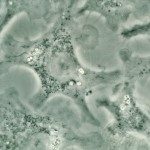Link to Pubmed [PMID] – 15579372
Cytokine 2005 Jan;29(1):1-12
Interleukin-10 (IL-10) is a well known anti-inflammatory cytokine. However, we previously showed that it could present pro-inflammatory properties on human monocytes in the absence of adherence. In the present study, using macroarray technology, we analyzed the effects of IL-10 and adherence on the expression of 1050 genes in human monocytes cultured for 3 hours on plastic or Teflon(R) (to avoid adherence). Adherence alone induced specifically the expression of 12 genes and repressed that of 25 genes. In adherent monocytes, IL-10 induced the expression of 21 genes and repressed that of 50 genes. In non-adherent monocytes, IL-10 induced the expression of 45 genes and repressed that of 67. Only 3 common genes were induced while 35 common genes were repressed by IL-10 in the two culture conditions. Interestingly, we showed that IL-10 modulated conversely on Teflon(R) and plastic the expression of 16 genes, of which SOCS molecules, coproporphyrinogen oxidase, matrix metalloproteinases and complement receptor-1 (CD35). This study demonstrates that adherence has profound modulatory effects on the properties and the signaling induced by IL-10. The discovery that IL-10 can inhibit the production of coproporphyrinogen oxidase (an enzyme involved in the synthesis of heme) may shed some lights on the mechanisms of anaemia induced by IL-10. Furthermore, the inhibition of the expression of SOCS1 by IL-10 in the absence of adherence, may explain its priming effects on a subsequent LPS stimulation that we previously described.







